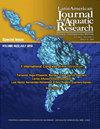巴西北部帕拉州一个岛屿地区休闲淡水中肠道病毒和轮状病毒A的两年监测
IF 0.8
4区 农林科学
Q3 FISHERIES
Latin American Journal of Aquatic Research
Pub Date : 2022-11-01
DOI:10.3856/vol50-issue5-fulltext-2844
引用次数: 0
摘要
肠道病毒是水传播疾病的主要原因,并且在感染者的粪便中大量存在。它在环境中的生存能力持续数月,有利于消费和娱乐用水的污染。该研究旨在从2012年1月至2013年12月,每月监测巴西北部一个用作澡堂的岛屿地区休闲淡水中肠道病毒(EV)和A组轮状病毒(RVA)的循环情况。用异硫氰酸胍/二氧化硅通过吸附洗脱法浓缩病毒后获得病毒RNA。分子检测采用半(EV)和套式PCR(RVA),扩增子在自动测序仪上测序。40.4%(42/104)的样本中至少检测到一种病毒。RVA是最常见的(n=32;30.8%),与EV(n=20;19.2%)相比。两者之间的共循环为9.6%(n=10)。病毒阳性率最高的是SP02(46.1%)。最高的病毒阳性率出现在高潮期间(57.7%;60/104)。大多数EV样本的特征是柯萨奇病毒A5(85.7%,12/14),其他样本的特征为萨宾1型脊髓灰质炎病毒(14.2%,2/14)。RVA阳性样本的基因分型为G2、G3、G9、G12、P[8]、P[4]和P[6]。这些病毒在35.6%(37/104)的粪便大肠菌群浓度可接受的样本中检测到。这些结果表明,即使细菌指标在容许限度内,用于娱乐的地表水也会受到公共卫生关注的肠道病毒的污染,这一因素证实了在污水排入水体之前进行污水处理的公共政策的必要性。本文章由计算机程序翻译,如有差异,请以英文原文为准。
Two-year monitoring of enterovirus and rotavirus A in recreational freshwater from an island region, Pará State, northern Brazil
Enteric viruses are major causes of waterborne diseases and are present in large quantities in the stools of infected individuals. Its viability in the environment lasts for months, favoring the contamination of water used for consumption and recreation. The study aimed to monitor monthly the circulation of enterovirus (EV) and group A rotavirus (RVA) in recreational freshwater from an island region used as a bathhouse in northern Brazil, from January 2012 to December 2013. The viral RNA was obtained using guanidine isothiocyanate/silica after viral concentration by adsorption-elution method. The molecular detection was carried out by semi (EV) and nested-PCR (RVA) and the amplicons were sequenced on automated sequencer. At least one of these viruses was detected on 40.4% (42/104) of the samples. RVA was the most frequent (n = 32; 30.8%) when compared to EV (n = 20; 19.2%). Co-circulation between both was identified in 9.6% (n = 10). The highest viral positivity was found in SP02 (46.1%). The highest viral positivity was observed during high tides (57.7%; 60/104). Most EV samples were characterized as coxsackievirus (CV) A5 (85.7%, 12/14) and others as Sabin 1 poliovirus (14.2%, 2/14). The RVA positive samples were genotyped as G2, G3, G9, G12, P[8], P[4], and P[6]. These viruses were detected in 35.6% (37/104) of the samples with an acceptable concentration of fecal coliform bacteria. These results demonstrate the contamination of surface water intended for recreation by enteric viruses of Public Health concern even when bacterial indicators are within the tolerated limit, a factor that confirms the need for public policies aimed the sewage treatment before its release into water bodies.
求助全文
通过发布文献求助,成功后即可免费获取论文全文。
去求助
来源期刊

Latin American Journal of Aquatic Research
FISHERIES-MARINE & FRESHWATER BIOLOGY
CiteScore
1.70
自引率
10.00%
发文量
44
审稿时长
4-8 weeks
期刊介绍:
Latin American Journal of Aquatic Research- LAJAR is the continuation of the journal Investigaciones Marinas (1970-2007) and is published since 2008 by the Escuela de Ciencias del Mar, Facultad de Ciencias del Mar y Geografía of the Pontificia Universidad Católica de Valparaíso. LAJAR is an “Open Access” journal that publishes in English language, original research articles, reviews and short communications on aquatic science, which contain the results of research conducted in aquaculture or in oceanic and coastal marine waters of Latin America.
The following topics are considered: Physical Oceanography, Chemical Oceanography, Marine Biogeochemistry, Marine Pollution and Toxicology, Marine Geology and Geophysics, Biological Oceanography, Fisheries and Aquaculture.
 求助内容:
求助内容: 应助结果提醒方式:
应助结果提醒方式:


